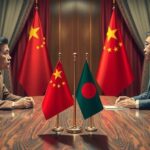Politics
ASIA, BANGLADESH, BEIJING, BILATERAL COOPERATION, BILATERAL TRADE, CHINA, DHAKA, DHAKA ELEVATED EXPRESSWAY, ECONOMIC TIMES, GEOPOLITICS, HASINA, INDIA, JASHIM UDDIN, MEXICO, MINISTRY, MUHAMMAD YUNUS, NEW DELHI, NORTH AMERICA, PADMA BRIDGE, SHEIKH HASINA, SOUTH ASIA, STRATEGIC PARTNERSHIP, TIMES, TRADE, WHAT, YUNUS
Nia Simpson
Bangladesh’s Yunus to Engage with China’s Xi Amidst India Strain
Muhammad Yunus is scheduled to meet with China’s Xi Jinping amid strained relations with India following the removal of Prime Minister Sheikh Hasina. Bangladesh’s growing dependency on China, which has become its largest trading partner, may reshape South Asia’s geopolitical dynamics and challenge India’s influence. Chinese investments are surging, promising significant infrastructural and economic developments in Bangladesh.
Muhammad Yunus, the Nobel laureate from Bangladesh, is set to meet with China’s President Xi Jinping, which highlights the changing diplomatic landscape in South Asia amidst tensions between Bangladesh and India. Yunus’ ascension to prominence came following the removal of former Prime Minister Sheikh Hasina, who was considered a key ally of India. Hasina’s exile in India has left unanswered requests for her return to stand trial, further complicating the relationship between Bangladesh and India.
In stark contrast, relations with China have flourished, making China Bangladesh’s largest trading partner with an impressive annual trade volume of $25 billion. Despite this thriving trade relationship, Bangladesh’s exports to China stand at just $1 billion, even as China has extended zero-tariff market access on a variety of goods. As Bangladesh’s reliance on Chinese economic support increases, analysts suggest that this shift could significantly alter the balance of power in South Asia, diminishing India’s traditional influence in the region.
Since the installation of the interim government, Chinese firms have emerged as major investors in Bangladesh, with over 14 companies contributing upwards of $230 million, according to Chinese Ambassador Yao Wen. The Chinese government has expressed enthusiasm regarding Yunus’s visit, indicating a mutual interest in deepening bilateral cooperation and exchanges. This collaboration encompasses major infrastructure projects, including the Padma Bridge rail link and the Dhaka Elevated Expressway.
During Yunus’s visit, there may be announcements concerning fresh investments, establishment of special economic zones, health initiatives, and discussions regarding loans, as affirmed by Bangladesh’s Foreign Secretary Jashim Uddin. The developments in this diplomatic engagement are anticipated to further consolidate China’s influence in Bangladesh and challenge India’s strategic objectives in the region.
The anticipated meeting between Muhammad Yunus and President Xi Jinping underscores a significant diplomatic shift in Bangladesh’s relations, particularly in the context of waning ties with India. As Bangladesh increasingly aligns with China, there are substantial implications for South Asia’s geopolitical landscape, potentially eroding India’s influence. Factors such as Chinese investment, infrastructural development, and economic agreements will shape the future trajectory of Bangladesh’s foreign policy and economic stability.
Original Source: m.economictimes.com








Post Comment